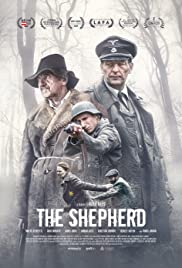
THE SHEPHERD/ A PASZTOR
Hungary, 2019, 91 minutes, Colour.
Miklos Szekely B, Akos Horvath.
Directed by Laszlo Illes.
The title looks very simple. And, in fact, for the first 15 minutes, there is a very slow contemplation of the shepherd himself, an elderly man, living alone, going through his routine with the sheep, his washing, preparing his breakfast, ready to go out into the fields.
Then the atmosphere begins to change, the shepherd discovering a number of dead bodies lying in the fields, Jews escaping from the authorities.
The narrative then makes a transition to the focus on the German soldiers, along the country road, van full of Jewish prisoners, a focus on the young soldier of only several months, and a sister and brother amongst the prisoners. When a tree blocks the road, the prisoners escape, leading to the pursuit and their being shot. The brother and sister try to escape together but are caught, the brother being shot, and, disturbingly graphic, the autocratic commander orders the young soldier to rape the woman. The shepherd finds the woman, wraps her in his overcoat and carries her to his house in safety.
While this is very grim, the portrait of the Germans is even grimmer, the commander supreme in his arrogance, the van driver cruel in his violence, the young man obedient to the authorities.
The last part of the film, the soldiers search the shepherd’s house and barn, talk with him, sharing drink, learn his story – but a refugee grandfather and his granddaughter are found in the barn and, disturbingly graphic again, are hanged.
The film is quite pessimistic in its picture of this Hungarian episode, symbolic of so much violence, killing, persecution of Jews in central Europe.
1. Simple title? The focus? The elderly man, widower, with his sheep, the opening, his washing, into the house, his breakfast, going out with the sheep? A long contemplative introduction to him and to the film?
2. The action taking place over one day? In winter? The clouds, the rain? The setting of the house, the fields, the woods, the road? The musical score?
3. Audience patience, the gradual introduction of the themes, hearing the shots, the dead bodies of those who fled, lying in the fields? The shepherd and the man leaning against the tree, the naked body of the woman? The response of the shepherd?
4. The transition in the action, the van on the road, the German soldiers, the prisoners inside, the range, Jewish, their fears, the sister urging her brother to make enquiries? The driver? The autocratic leader? The young recruit on guard in the van? The episode of the tree across the road?
5. The prisoners escaping, the young soldier being blamed? The pursuit? The ruthless shooting down of the escapees? Going more deeply into the woods, people hiding, people shot?
6. The focus on the sister and brother? Plan to escape, to the next village? The temporary success? Confronted, the brother and his wounds, against the tree? The sister and the approach of the soldiers? The commander, his ordering the young man to rape the sister? The effect on the man, threats, his compliance? The ordeal for the sister, the attack, the abuse, humiliation? Left naked? The brother watching?
7. The commander, the men, the fields, the shepherd and the sheep, going to his house?
8. The shepherd, finding the raped woman, the coat, carrying to her to the house, to save her, hiding her?
9. The soldiers, the examination of the house, sharing the drink, the conversation?
10. The revelation of the old grandfather and the granddaughter hiding, then being discovered, the threats, the rope, their being hanged?
11. The confrontation with the shepherd, the guns, his witnessing the hanging, the shock of his death? The sister escaping…?
12. A grim portrait of a war episode, Hungarian consciousness, a pessimistic version and interpretation of the events?